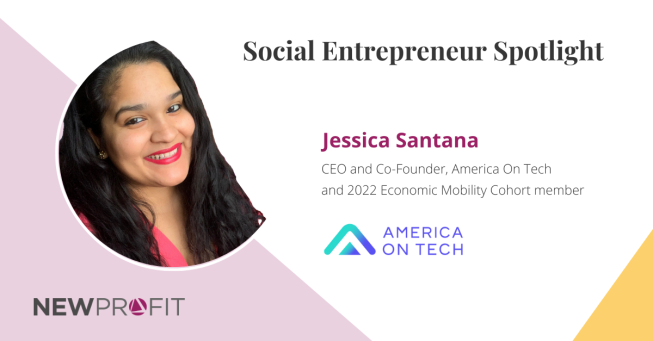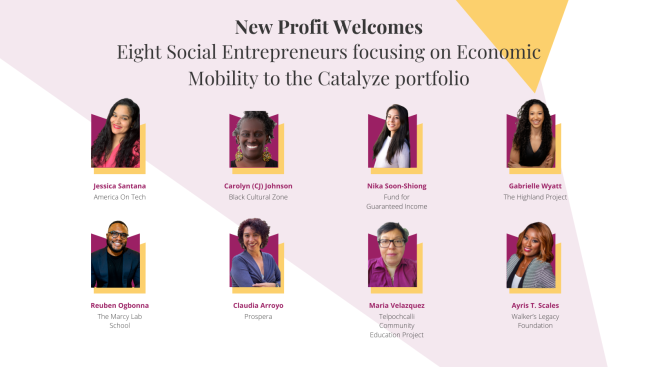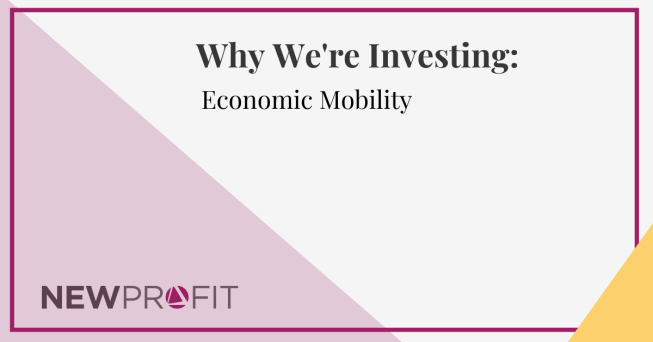Social Entrepreneur Spotlight: Jessica Santana of America On Tech

America On Tech (AOT), one of eight organizations in New Profit’s first Economic Mobility Cohort, envisions a world where young people of color across the country have equitable access to compete fairly for opportunities in the technology sector. AOT’s mission is to decrease the racial wealth gap by increasing equitable pathways for underestimated students into degrees and/or careers in technology.
To help us get closer to AOT’s work, Co-Founder and CEO Jessica Santana spent some of her valuable time sharing more about what drives her, inspires her, and keeps her going during challenging times. We’re pleased to share Jessica’s wisdom below.
Q: What is the one thing you wish more people knew about the challenges America On Tech is working to address?
A: I want people to know that genius is equally distributed and opportunity is not. Our country is racially diverse and this means our innovation sector has to be representative of people of color, especially Black and Latinx people. It is not due to a lack of talent, but rather a lack of equitable and accessible career pathways.
In the US, poverty, race, and education are inextricably linked. Black and Latinx students are more often socioeconomically disadvantaged and attend schools with fewer resources, fewer credentialed teachers, and limited access to extracurricular activities and experiences, particularly in STEM, that significantly impact their educational experiences and career trajectories.
“ Plainly stated: digital equity for Black and Latinx youth is a social, racial, and economic justice issue. Until the tech sector is more representative of them and the needs of their communities, injustices will persist. Jessica Santana, CEO and Co-Founder, America On Tech
Q: What has been the most fulfilling part of the work that you do?
A: The most fulfilling part of the work I do with America On Tech is when one of our young people highlights a job or internship they received through our network and the support we provide them. They are the brightest spots for me because it signals that young people are fulfilling their full purpose, promise, and potential in our programs.
Most recently an alum received a job to work for one of the world’s largest technology companies making a total compensation package of $190K. This student is only 21 years old and they are living proof of the wildest dreams I have for our young people and our communities. These are the moments I need to keep going.
Q: What person/people have had the biggest influence on your involvement in this work up until this point?
A: My co-founder, Evin Robinson, has been the biggest influence on my involvement in this work up until this point. In the early stages of AOT, it could have been easy to give up. We received a lot of rejections, it was difficult to raise money (still is lol), people did not believe in our work or that our young people could actually get careers in tech coming from the communities we were serving. Without his support and our partnership to lean on, I am not sure that I could have kept the emotional resiliency required to keep going. I am appreciative to have someone just as committed to the work to check in on me during the most challenging times and reaffirm that we matter and that our young people matter and deserve the absolute best.
Q: With the rise of a focus on mental health do you have any practices, resources, or advice that you might offer to individuals working in the field that may be experiencing burnout?
A: Justice work is all-encompassing. Every project you work on feels urgent, every young person’s life you touch feels crucial and the emotional labor required every day to fight against systems of oppression that further white supremacy and anti-abolitionist practices is exhausting. In the last seven years working on AOT, I have realized that I am not good to anyone without caring for myself.
My favorite quote from Audre Lorde says, “Caring for myself is not an act of self-indulgence, it is self-preservation, and that is an act of political warfare.”
“ It is in the moments when I am feeling most outraged and most drained from the work that I practice rest as resistance as part of the healing necessary to continue the fight for justice. Jessica Santana, CEO and Co-Founder, America On Tech
Self-care for me looks like prioritizing my joy, leaning on mentors and other peers, and being actively enrolled in therapy. I journal every morning and I hold myself accountable to my unlearning process and give myself grace to understand that I am not perfect and that undoing centuries-old systems of oppression is not an easy feat.
Self-care also looks like ensuring that those around me understand my boundaries and can articulate them. It means advocating for myself when no one else around me is protecting me. As a leader of color, I feel like I’ve been fighting for our young people at AOT and at the same time fighting for myself, my family, and my friends. This work comes at a double emotional expense for us, as we re-trigger our traumas in the pursuit of liberation for those that look like us, that share our lived experiences.
Self-care for me is always evolving, but we owe it to ourselves, our ancestors, elders, and loved ones to ensure that we show up the best versions of ourselves every day.
To get closer to America On Tech visit their website. Learn more about why Economic Mobility is a key investment area for New Profit here.

